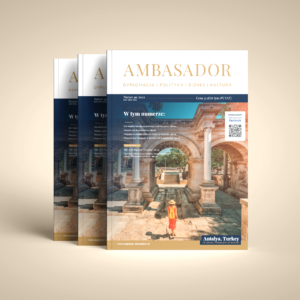It’s that we can’t not dance was the message echoed from the film “Steps of Freedom” which guests at the St Patrick’s Day celebrations had the pleasure of watching at the Muranów Cinema in Warsaw, on March 18th, at the invitation of H.E. Patrick Haughey, Ambassador of Ireland, and his wife.
His Excellency Patrick Haughey Ambassador of Ireland to Poland welcomed the guests to the St Patrick’s Day reception, and said that the day is a celebration of Ireland’s connections around the world. On this day, the Irish people come together to pay tribute to the country’s traditions and rich history and to share the joy with friends.
In his speech, H.E. the Ambassador spoke of the relationship between the two countries, adding that the ties between Ireland and Poland have never been stronger.
– Politically, our countries have worked closely together in the European Union on the most pressing challenges facing our continent. We have supported the brave people of Ukraine, invested in our defence and security, and promoted the competitiveness of the European economy, said H.E. Patrick Haughey. – Economically, the relationship between Ireland and Poland has developed rapidly. Bilateral trade between Ireland and Poland has now grown to over €8.5 billion.
In his speech, H.E. the Ambassador also stressed that the most special part of the Polish-Irish relationship is the bond between people. He pointed out that less than 20 years ago Poland joined the European Union and since then tens of thousands of Poles have moved to Ireland, making a huge contribution to Irish society. There are currently around 100,000 Poles living in Ireland and Polish is the third language in Ireland.
In addition, H.E. the Ambassador mentioned that he was delighted to see such a great affection that Poland has for Ireland, including music, literature, film, and dance, and invited guests to watch the film “Steps of Freedom”, which showed the history of Irish dance through the centuries.
Each year on St Patrick’s Day, the Irish Embassy presents the Bernard O’Connor Award to an individual or organisation that has made a significant contribution to friendship, cooperation and understanding between Ireland and Poland. The award, established by the Irish Embassy in 2018, honours an important figure in the history of Irish-Polish relations – Bernard O’Connor, who was a physician at the court of King John III Sobieski and wrote the first history of Poland in English.
The 2025 Bernard O’Connor Prize was awarded to Krzysztof Schramm.
For more than 35 years, Krzysztof Schramm has been helping to build links between Ireland and Poland. In the 1990s, he founded the Irish-Polish Society and then in 1999 began working at the Irish Honorary Consulate in Poznań. Over the next 25 years in Poznań, he helped hundreds of Irish citizens in need and assisted in the organisation of high-level visits (including the memorable visit of President Michael D. Higgins during Euro 2012). Together with his wife Justyna, he has done much to promote Irish culture, tourism, literature and history in Poland.
In presenting the award to the Vice Consul, H.E. Ambassador Patrick Haughey said: For over thirty-five years Krzysztof has made a huge contribution to building links between Poland and Ireland. He and his wife Justyna have reached out to thousands of people across Poland, sharing their knowledge and love of Ireland. We are very grateful for his efforts. He is a very worthy recipient of the Bernard O’Connor Award.
After the award ceremony, H.E. the Ambassador invited the guests to watch the film and wished them a great experience at the screening.
The film ‘Steps of Freedom: The Story of Irish Dance’ tells the story of Irish dance, showing its development and importance. It has played a pivotal role in Irish history, particularly in the context of the struggle for independence and the preservation of national identity during British rule. Although not a direct political tool, it was a symbol of resistance to colonialism.
Alongside music and literature, dance helped to maintain national traditions and unite society, with evening dance parties (céilí) in particular strengthening social bonds. In the twentieth century, after independence, Irish dance became an important part of building national identity and resistance, as well as a way of uniting communities. Over time, it has also been a tool for promoting the culture around the world, particularly through dance groups such as Riverdance. Today, it remains an important symbol of Ireland’s cultural heritage.



Sledź nas na: